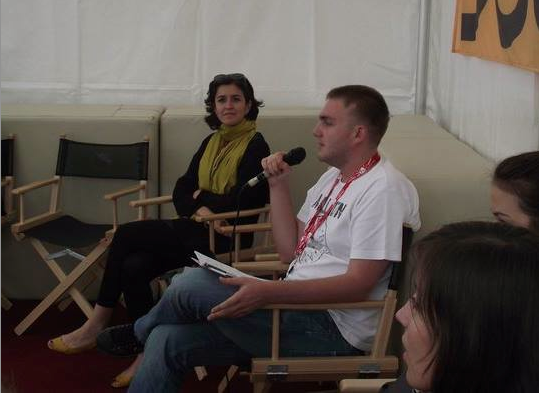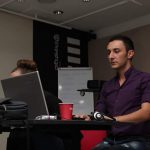
In a country such as ours, where young people don’t go to other parts of the city where they were born solely because they were taught not to, Nikola is a hero.
Nikola Čvoro, 25-years-old, lives and studies in Pale (East Sarajevo). He is currently completing his Master’s thesis at the Law Faculty of the University of East Sarajevo. If being a hero today means thinking for yourself and listening to your conscience, without regard to “law of environment,” then our Nikola is an ordinary hero. He is ordinary in the sense that he is not featured in media, he does not take money for what he does, and he is not a typical representative of his surroundings.
“When you live in Pale, you find it difficult to deal with all the negative things associated with this place, whether you hear them in media or in person,” Nikola begins his story. He explains that whenever he introduces himself to someone and tells them where he’s from, Radovan Karadžić and war-related events are mentioned without fail.
“It is not pleasant to listen to things like that about the place where you live, especially when you know that you can represent a different, brighter side of Pale,” adds Nikola, noting that this is one of the reasons he became actively involved in reconciliation in our country.
Nikola is an active member of debate club at his university. “It’s an interesting hobby, not only for the socializing, but also because you can learn how to use arguments and rational approaches to various subjects, which are things we generally lack in this society,” explains Nikola. He says that debate club was his introduction to his engagement in the NGO sector in Bosnia-Herzegovina.
“It may seem silly, but when you step out of your surroundings, you realize how many young people in Bosnia think like you do, and that they share the same aspirations and the same problems,” says Nikola.
Attaching a label
According to Nikola, the state of society is unfavorable and, as such, initiatives coming out of Sarajevo or Banja Luka are viewed with mistrust. He explains that when reconciliation is mentioned there is always someone who will be bothered by it. He admits that it’s not pleasant to be working in an environment where someone can label you as a mercenary or a traitor, even though he has never directly experienced this problem himself.
Nikola says that he has met a lot of young people through his work who are trying to initiate change in society. “As a student of law, I worked on some proposals for justice system reform,” says Nikola, adding that he participated in various projects that connected youth from across Bosnia.
“I was very fond of the debate club gatherings at our faculty because it was a real example of how young people of this country can and should work together,” says Nikola. He recalls how, when he was a student in high school, it was not common to have friends from the other entity.
“When I remember that period, I see that some things have gotten better, but we young people still have a lot of work to do,” he states. He believes that young people must abandon their passive attitudes, not towards the society and the state, but towards themselves.
“The saying that all is good until there is a shooting, is not something we can and should be using. We have very little now and we must change that.” Nikola is determined when he says politicians should help young people, but he also believes that if we don’t vote, we don’t have any right to ask them for help.
According to Nikola, thanks to informal processes the trust is slowly being built among young people who are separated by entity and other lines. “It must be emphasized that the strengthening of trust among the youth will help us to cope with and confront serious issues—ones for which there are no agreements,” he says.
Forgotten Trust
Nikola points out that trust is often forgotten. “It is implied that trust exists when that is not, necessarily the case. Only when we young people trust each other, regardless of what the politicians, the media or anybody else says, can we hope for serious change,” he concludes.
For these reasons, I have identified Nikola as an ordinary hero. In a country such as ours, where young people don’t go to other parts of the city where they were born solely because they were taught not to, Nikola is a hero. Sarajevo and East Sarajevo do not carry that unfortunate epithet of an incident city, like Mostar does. On the other hand, there are many differences dividing these two young cities. Nikola tries to overcome these differences and is an example of what is possible.
In his free time, Nikola is a talented reciter and a member of the youth amateur theater in Pale. “Reciting is something I enjoy a lot and, because I’m not shy, I am happy to share it with others,” adds Nikola, smiling.
Nikola believes that Bosnia has enough young people that do not fit into the existing patterns. “If I said young people in Bosnia are uninterested in society or politics I would offend all those wonderful, creative and capable young people I met,” says Nikola. He adds that those are the people – his colleagues and acquaintances, in which he sees the chance for a better Bosnia. “We cannot change ourselves or our country overnight, but we can make a decision overnight, and that is a way to start,” says Nikola, full of belief in the people around him.
It is certain that at least every other street in this country has a Nikola on it. Maybe we won’t read much about them, or see them on the front pages, but that does not mean that their efforts are in vain. On the contrary, if we all did something for someone else at least once a day, even if it was only symbolic, we would create a better world for ourselves.
This piece was recently awarded an honorable mention in the Post-Conflict Research Center’s “Srđan Aleksić Youth Competition,” which challenges young people in Bosnia to discover, collect, and share stories of peacebuilding, moral courage, and interethnic cooperation from their local communities, and is kindly funded by the National Endowment for Democracy. Through the competition, the center hopes to inspire youth to take an active role in the promotion of positive examples of people who are making a difference in the lives of others in Bosnia-Herzegovina.






